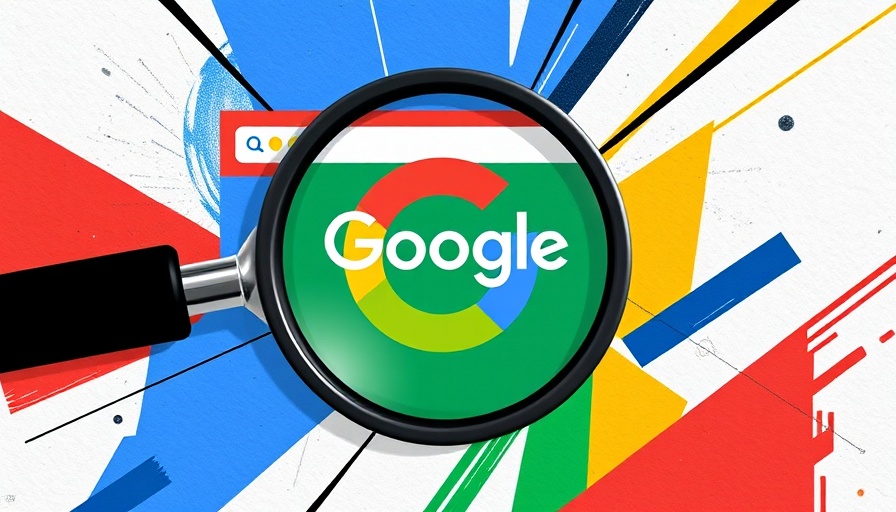
Google's AI Catch-Up: Is It Too Little, Too Late?
For decades, Google has been synonymous with search, dominating the market while continuously refining its technology. However, in an age when artificial intelligence is transforming how we access information, many are questioning whether Google is still a leader or merely playing catch-up, especially against emerging competitors like OpenAI and its ChatGPT. Recent announcements regarding Google's integration of AI features into its search capabilities raise eyebrows, adding to the discussion around its place in the rapidly evolving tech landscape.
The Latest Innovations: Are They Groundbreaking?
As highlighted in recent news, Google’s latest features, such as AI Mode within Gemini, are perceived more as a response to existing innovations rather than groundbreaking advancements. This feature allows the search engine to provide deeper and more contextual answers, resembling AI capabilities that OpenAI’s ChatGPT has showcased for some time. While Google’s AI Mode brings enhanced reasoning and conversational follow-ups, the innovation feels reactive rather than proactive.
In her article, Sarah Rogers emphasizes that the timing of these innovations—especially in March 2025—suggests a hurried effort to reclaim ground lost to OpenAI's advancements. The limited access to AI Mode, currently restricted to paid accounts, raises questions about why Google hadn’t rolled this out sooner. A gap has emerged, indicating a significant variance in innovation speed between different tech giants.
An Elevated User Experience?
In a comparison with ChatGPT, another vital aspect comes into focus—user experience. Those who have used ChatGPT have noted its direct, human-like interaction style, making information retrieval feel seamless and informative. For instance, when inquiring about the latest news or tourist attractions, ChatGPT provides an interactive exploration that aligns better with user preferences, as evidenced by tests that showcased its response time and clarity over Google’s traditional link-heavy approach.
This hits on a critical point of user engagement. As ChatGPT leads by providing a more intuitive experience, Google’s approach can feel cluttered and advertising-driven, which may not resonate with users seeking straightforward answers. This growing preference for conversational AI may prompt Google to rethink its interface design and search strategy.
Big Data and User Privacy Concerns
Google's extensive data collection capabilities, which could empower more personalized user interactions, may paradoxically lead to privacy discomfort. Users have expressed concerns about how their data is used, particularly in contrast to the more user-friendly privacy stance taken by newer platforms like ChatGPT. Despite having a wealth of historical data, Google risks alienating users who prioritize privacy and straightforward information retrieval over data-driven ad targeting.
As more users choose AI tools that focus on privacy and tailored experiences without intrusive advertisements, Google may need to innovate its privacy policies to retain its user base. Balancing innovation with user trust will be vital as tech companies navigate the evolving landscape of AI.
Future Predictions: The Road Ahead for Google?
Google certainly possesses the resources and expertise to lead in AI and search technologies. However, its legacy as a giant in the digital space presents challenges unique to traditional companies; the need for rapid innovation clashes with the risks associated with disrupting existing revenue models. Future disruptions may force Google to prioritize innovative thinking beyond mere features, aiming for a transformed user experience core to its service.
Industry observers wonder whether Google can break free from its past, or if its drive for innovation will remain hamstrung by its legacy products. As seen in the dynamic nature of AI technology today, the companies that embrace agility and user-centric design will dominate the future tech landscape. The stakes are high, and the potential consequences lie not just at Google’s doorstep but echo throughout the industry.
Taking Action: What Businesses Should Consider
For businesses interested in the latest internet technology and AI advancements, it’s crucial to stay informed about these trends that define user preferences and industry standards. Watching how companies like Google adapt to the demands of a more AI-driven marketplace will provide valuable insights. Embracing AI technologies, understanding evolving consumer behavior, and re-evaluating data practices can enhance competitiveness.
As the landscape is reshaped by powerful AI tools, businesses must adapt their strategies to ensure they leverage powerful insights driven by AI, engaging their audiences in compelling and innovative ways.
In a world increasingly shaped by AI, understanding these shifts is not merely an advantage—it’s a necessity for survival.
 Add Row
Add Row  Add Element
Add Element 


 Add Row
Add Row  Add
Add 

Write A Comment